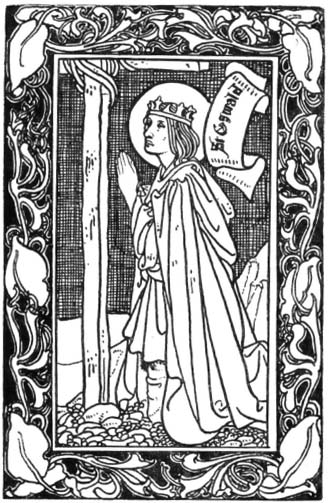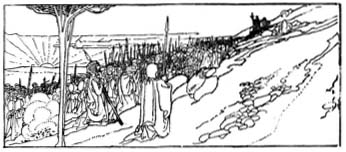
WHEN he was a lad, Prince Oswald lived in exile among the wise monks of Iona, a long way from his own country of Northumbria. It was a troublous time for the Christian faith in the seven kingdoms of England. The heathen king, Penda, had slain the first Christian king of Northumbria, and seemed likely to drive the true faith out of England altogether. Northumbria was in a most miserable condition. Two apostate kings tried to rule it; but a friend of Penda, the fierce British king, Cadwalla, came up and slew them both, and then for one year harried and wasted the wretched country.
From the little island of Iona, where he had learnt the glory of Christ's faith, Oswald watched the tyranny of Cadwalla. Then he determined to save his country. So he landed in England, got together a small army, and marched boldly to meet the cruel king.
At last, one night, the two armies lay close together, and everyone knew that next morning a great battle would decide the victory. On one side of a brook called Denisburn lay the host of Cadwalla; they were sleeping comfortably, because they felt quite certain that no one could defeat them. On the other side was the army--the little army, of Oswald. He sat by his tent watching the enemy's watch-fires that twinkled in the night; and he sighed as he thought of the fearful odds that were against him. Then he looked up at the sky, and the quiet stars that shone down brought great comfort and hope into his soul. And, as he looked, a figure came down to him, a slight, dream-like figure of an old man with a solemn and lovely face. "It is the blessed saint, Columba!" said Oswald to himself; and the lips of the figure seemed to move and say these words: "God has promised you the victory!"
"Ho, there! my men," cried Oswald, and the sleeping soldiers near him arose in the darkness at his voice. "Fetch me two long pieces of wood. There is something we must do to-night." They brought two great beams, and these they nailed together to form a cross. Then they dug a hole in the ground; and, as the stars were paling in the sky, all the army began to marshal in its ranks, till the men stood ready in the cold night air with their round wooden shields and sharp spears. Then Oswald with his own hands held up the cross, while the men shovelled the earth into the hole, and stamped it down firm with their feet.
And now the night had faded away, and as the first light of dawn fell upon the cross, Oswald cried out to his army: "Let us kneel and pray together to the true and living God to defend us from this fierce and cruel enemy. For He knows that we have undertaken a just war for the safety of our nation!" So the army knelt and prayed silently.
Then they rose in the morning light, and with a great shout rushed forward to meet the enemy. Long and fierce was the fight. But in the end Cadwalla was slain, and the Britons fled over the hills to their own country.
Men called the place of battle no longer Denisbum, but Heaven's Field; and the rough wooden cross they ever after looked upon as a holy thing, cutting off chips from it to heal those who were in sickness.
Oswald was now king of Northumbria, but the land was in misery and confusion, with no government, or churches, or clergy. So he sent off to his old home, Iona, where the good Irish monks lived, and asked the abbot to send him a bishop. They sent him St. Aidan, to whom the king gave the island of Lindisfarne for his cathedral see. From that time these two saints--bishop and king--worked together for Christ and the people; and many were the wise plans they formed in the king's house, which stood where Bamborough Head looks out upon the sea and upon Lindisfarne.
The good work went on quickly. Oswald built churches, and gave his wealth and lands to found monasteries; Aidan baptised, and preached, and ordained priests, till the land was won back to Christ. Yet Aidan knew at first but little of the English tongue; and, when lie preached in the king's court, Oswald himself would stand up and interpret the words as they fell from his lips. Nor was it only in his own land that Oswald worked for Christ; for he it was who stood godfather to the pagan king of Wessex, when he was baptised into the Church of God. All men loved and revered King Oswald. He made the two halves of Northumbria into one kingdom, and became overlord of all England.
Great monarch as he was, men almost forgot his earthly power in their love for his heavenly goodness. For in him they saw a new kind of kingship, and learned that a king could be, not only a brave warrior, but a wise ruler and a kind father to his people. It is not easy for a king, who sees men bowing down before him, to remember the humility of Christ; it is not easy for one who has so much wealth and power to set himself to use it for others; nor is it easy for him who has all pleasures at his command to spend his life in self-denial and prayer. But Oswald had strength to be pure, and so constant was he in prayer, that he used always, where-ever he sat, to hold his hands turned up on his knees as one who was ever listening for God's voice.
He was always courteous and affable with the poor, although he was the overlord of all England, and he never ceased to help them with his money, and to care for strangers and sick folk. One Easter Day, when he was sitting in his palace at dinner with Bishop Aidan, a silver dish full of dainties was before them. He had just asked the bishop to say grace, when the servant whom he had appointed to look after the poor came in, and said: "Oh, my lord, there is a great company of poor people outside; they have come from all parts, and now they are sitting in the streets and asking for some alms of you." The king looked down at the meat which was smoking before him. "Carry this out to them," he said, "and as for the silver dish, let it be cut in pieces and divided among them." Then Aidan, who had sat quietly, watching it all, felt a great joy rise in his heart. He seized Oswald's right hand, and cried: "May this hand never grow old!" And so, indeed, it happened afterwards, as you shall hear.
Oswald reigned in peace for eight happy years, and all the people blessed his name. But Penda, the heathen king of Mercia, had not lost his power of mischief; and Oswald, hearing that he had fought and killed the Christian king of East Anglia, marched down to rescue the conquered people from his tyranny.
It was not to be. At Maserfield Penda's host fell upon the Northumbrian army, and Oswald saw, as he looked upon the striving, shouting mass of warriors, that the day was lost. Closer and closer came the heathen host, and louder sounded the cries and groans, and the crash and thud of sword and spear and axe. His faithful followers fell one by one at his side, till Oswald could see nothing but the blood-stained weapons of his foes. Then, lifting up his voice to God for the last time, he prayed for the souls of all his soldiers who had fallen.
The next moment his body lay among the slain, and the heathen soldiers waved their spears in the air with a hoarse shout of victory. Penda had little respect for his conquered foe, even now that he was dead; for he cut off Oswald's limbs and put them upon stakes. But the words of St. Aidan came true, for the hand which he had blessed remained whole, as when it had been living, and for many a long year it was kept in a silver shrine at Bamborough Church, where pilgrims came from far to see the "white hand of St. Oswald."
So fell St. Oswald, thinking of others even in his death. And that last prayer of his became a proverb. Years after, folk would exclaim, "Lord have mercy upon their souls, as Oswald said when he fell to earth!" The very place where his body had lain became holy ground, so that those who came that way used to carry away the earth, till at last a big hole was made, deep enough for a man to stand up in.
Many were the stories that men used to tell of the powers of that wonderful earth. The first to find it was a Briton, who, travelling one day across the battlefield, noticed that on one spot the grass grew greener and brighter than anywhere else. "Some holy person must have died there," he said to himself, and took some of the earth away tied up in a cloth. When he reached his inn at sunset he hung the cloth on one of the wooden posts of the wall. That night, as he sat by the fire with the other travellers, a spark flew up, and set the thatch alight. The travellers rushed out, and in a little while the inn was burnt down. When the fire had died away they noticed with wonder that one post remained untouched. It was the post where the earth from Oswald's death-place had been hung!
For thirteen years after St. Oswald's death, Penda fought against the Northumbrians; but at last Oswald was avenged. His brother, Oswy, who was now king, came upon Penda's host near Leeds, and, having but a small army, he sent to offer gifts to the old heathen king if he would make peace. But Penda refused. Then Oswy cried out before his warriors, "If these pagans will not accept our gifts, let us offer them to One who will." He vowed twelve monasteries to Christ, and his own daughter to God's service as a nun. The battle was soon over, Penda was slain, and all his host swept away in the swift river. Thus the pagan warrior, who had killed five Christian kings, himself perished by the sword.
The fierce old heathen! Yet you shall not part with him till you have heard something to his credit. For, as St. Oswald loved his enemies, so must you learn to love them too. Penda in his old age softened towards the Christian faith; and though he saw it spreading among his subjects, and his own son was among those who were christened, he did not now obstruct the missionaries. But this is what he said: "I only hate those who call themselves Christians, and do not show forth the works of faith, or obey the God in whom they believe. If my subjects become Christians, they must be Christians in deed!"
